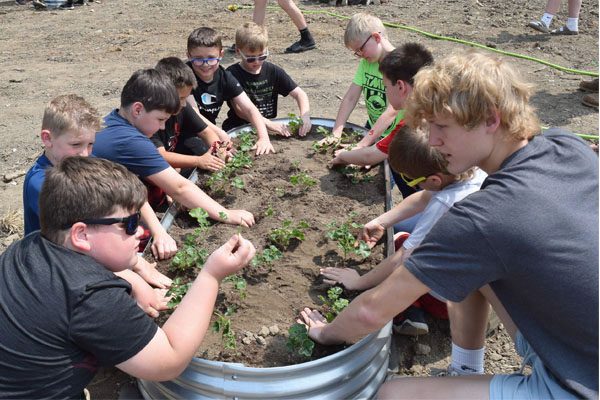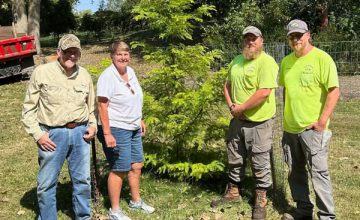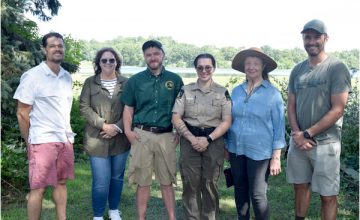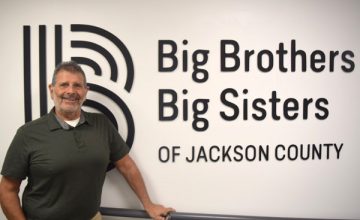Above: This group of Addison Elementary boys, students of second-grade teacher Ashley Harrison, all pitched into plant flowers in this raised garden bed. On the right is Addison High School sophomore Caleb Potts, one of the horticulture class students who helped the little guys.
By John Hummer
Editor
 Aaron Wesche’s (shown at left) Addison High School horticulture class is a lucky group of students. They are learning about everything in a life cycle process for living plants and creatures.
Aaron Wesche’s (shown at left) Addison High School horticulture class is a lucky group of students. They are learning about everything in a life cycle process for living plants and creatures.
Last week the students placed 20 raised flower beds in a field behind the Addison Schools campus. Then they enlisted the help of Addison Elementary students to plant the beds full of flowers. There are at least 24 flowers in each bed. This was just one step of the process.
Earlier in the spring, the students began to grow the starter flowers in the greenhouse on the campus grounds as well as plan out the flower bed field. The mature flowers will then serve as pollinator plants for the school’s bees which reside in the beehives at the back of the flower bed field.
When the bees produce honey, the horticulture students will then harvest the honey, bottle it, and sell it. They will then take the profits from the honey sales and put the funds right back into beehives, the greenhouse, and the garden project to keep the cycle going. (Continued below)
“We kind of had this master plan when we got the greenhouse to have raised bed gardens,” Wesche explained.
But that’s just one piece of the puzzle. It started before that when the district decided to go solar and put in a solar energy field out behind the schools. “For the solar [energy field], we had to cut down 25 percent of our forest so the sun could get to the solar panels. So, we had this big, open area we didn’t know what to do with. It had lots of tall weeds.”
Then the idea of a community garden germinated. “It kind of expanded from there,” he stated. Wesche’s horticulture class was then tasked with figuring out exactly what to do and how to do it. They spent all winter brainstorming ideas, conducting research, and coming up with plans for the land to make it productive once again. (Continued below)

Addison High School sophomore Caleb Potts, a student in Aaron Wesche’s horticulture class, teaches the basics of planting flowers to Addison Elementary second graders Camden Bordner, left, and Liam Lucas, right. They are students of second-grade teacher Ashley Harrison.
“They presented it to me, and I would then kind of give them suggestions, things to look at and things to think about,” he said. “The students have come up with these ideas – I just try to guide them – like what our budget is and what we’re capable of doing.”
The students realized they needed more funding for their plans, so they went to the Devil’s and Round Lake Men’s Club and presented what they wanted to do. The club donated $2,500 towards the project. Students made a similar presentation to the Kiwanis Club of Addison which donated $500 to the project.
“Coming into horticulture class, I wasn’t much of a planner,” said sophomore Caleb Potts, noting how you have to plan specifics when planting starter flowers in a greenhouse – like how many you want to plant, their cost, how far apart they should be planted and how often to water them. (Continue below)

Addison High School sophomore Sara Jaimes and junior Nate Houghton conduct a beehive inspection of the hives at the back of the flower bed field behind the Addison Schools campus.
When the students do a hive inspection, they are looking for the queen to make sure she is there and to look for eggs and larvae. Sara did find the queen and they saw a lot of brood and larvae. They also check for hive beetles or any other pests that might disturb the hive. “The hive appears to be healthy and growing quickly,” said their horticulture class teacher Aaron Wesche. COURTESY PHOTO
Dulce Delgado, also a sophomore horticulture student, noted that planning a community garden requires specific planning – like what type of posts and fencing to put around it to keep the critters out. She added that knowing things like the pH level of the soil is very important when growing things. She also noted specific care certain plants require like how you have to trim the petals of some flowers like geraniums to allow them to capture more nutrients.
With the two community groups’ contributions, flower sales from last year, and this year’s flower sale, the horticulture students had roughly $4,000 to put into the project. For the flower sale, students sell Mother’s Day flower baskets they make. This year they made $1,500 on Mother’s Day flower sales. “People couldn’t believe how beautiful they were,” Wesche said, adding, “All that money goes back into our greenhouse account to buy supplies and offer this opportunity for next year’s kids.”
However, Wesche, said, “One of the things we noticed is that the bees just didn’t have enough food around here. Then we decided to do the raised bed gardens as part of our project so we would have flowers out there for the bees.
“I like to say it’s self-sufficient,” he continued. “It doesn’t have to rely on the school budget much. [The students] are raising the money and it’s kind of their responsibility to make sure there’s money there for the next class.
“We sell the honey – that goes back into the bees; we sell the maple syrup – that goes back into equipment; we sell the flowers which supplies everything we need for the greenhouse.”

Addison Elementary School fourth grader Sophie Trumble focuses intently on planting a flower in one of the raised flower beds behind the Addison Schools campus. Sophie is a student of fourth-grade teacher Leslee DeRossett.
But there was still a plot of unused land left over from the solar field excavation. “We decided, ‘Let’s put a community garden in there and expand this out to the whole community,’” Wesche stated. “The vision is that we have a vegetable garden. The kids plant the seeds, raise the plants in the greenhouse, and then transplant them out to our community garden.” And that is what is happening at the end of this school year.
As vegetables grow and become harvestable later this summer, Wesche says the community is invited to come and pick the vegetables of their choosing. “Pull a couple of weeds, go home. You don’t owe us any money. If you want to make a donation, great, but we’re not charging anybody for it.” The class is growing peppers, squash, zucchini, and much more.
“It’s not only teaching the kids about having a service project and helping out their local community but also trying to connect Addison High School with the Addison community,” Wesche noted. “One of our administrator’s goals was to get that connection between the community and the schools.”
One more part of the overall project is the making of maple syrup from the maple trees in the remaining forest on Addison Schools’ property. “We tap our maple trees and the kids made 19 gallons of maple syrup this year,” he said. “They collected over 600 gallons of sap.” It takes 40 gallons of sap to make one gallon of maple syrup.
Wesche sets up the maple syrup-making equipment and does the sap boiling outside the school. He invites all the schools’ students to see how maple syrup is made.
Everything outside of the Addison Schools campus combined is now like one huge outdoor laboratory for Addison students. “It’s cool to actually see the project come to fruition,” Wesche says. “It’s not about tests and quizzes. I always ask the students, ‘Could you have done this at the beginning of class?’ They always say, ‘No, I didn’t know anything about this.’ Then I ask, ‘Could you go home and plant a garden?’ They say, ‘Oh yeah, no problem.’ It’s not that I taught them all this – it’s that I give them the opportunity to try out this stuff. They’ve taken it and just run with it.”







Transfer 19 257 US dollars. Withdrаw => https://forms.yandex.com/cloud/65a8ee1e5d2a0628db729f8e/?hs=4dd405297b196ebb4d97fd68a4599dd2&
February 12, 2024 at 11:58 am
y3k8xs
You got 31 847 USD. Gо tо withdrаwаl >> https://forms.yandex.com/cloud/65d4a4a02530c23caf44076a?hs=4dd405297b196ebb4d97fd68a4599dd2&
February 20, 2024 at 5:34 pm
1pcu1c